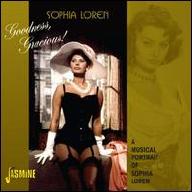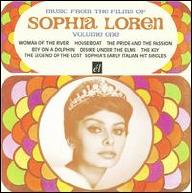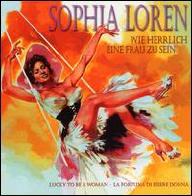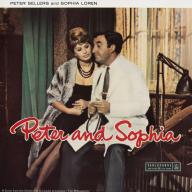By the mid-'50s, Loren was a star in Italy as well as a major sex symbol, but with the exception of 1955's #Attila Flagello di Dio, co-starring Anthony Quinn, few of her pictures were distributed internationally. That changed with Vittorio de Sica's #L' Oro di Napoli, which was recut and dubbed for foreign sale, resulting in poor reviews; Loren, however, was singled out for the strength of her performance as a Neapolitan shopkeeper, surprising many critics who had dismissed her as merely another bombshell. As a result, 1955's #La Donna del Fiume was distributed in both the U.S. and Britain, as were a number of other subsequent projects. Eventually, Loren emerged as an international star, and Ponti soon declared her ready for Hollywood; she moved tentatively into the English-language market with a pair of films shot in Europe, 1957's #Boy on a Dolphin (in which she appeared opposite Alan Ladd) and #The Pride and the Passion (starring Frank Sinatra and Cary Grant).
In 1957, Loren and Ponti were wed in Mexico; their marriage was a national scandal in Italy because Ponti had already been married once before, and a series of legal complications ensued -- one prominent Italian Catholic magazine even instructed readers to boycott her movies. In the meantime, Ponti orchestrated with Paramount a four-film contract for Loren's services, beginning with 1958's #Desire Under the Elms. In Hollywood, her acting skills blossomed, and she won Best Actress honors at the 1959 Venice Film Festival for her work in Martin Ritt's drama #The Black Orchid. However, she proved unable to draw audiences, a situation which her next film, George Cukor's idiosyncratic Western #Heller in Pink Tights, failed to remedy. 1960's romantic comedy #It Started in Naples, with Clark Gable, was Loren's commercial breakthrough, but Paramount had lost faith in her star power and cut her loose; she next traveled to Britain to film Anthony Asquith's #The Millionairess.
Upon returning to Italy, Loren reunited with de Sica in 1961's #La Ciociara, a wartime drama in which she starred as a widowed mother caught in a love triangle with her teen daughter (Eleanora Brown) and Jean-Paul Belmondo; containing by a brutal rape scene, the film won widespread acclaim, and Loren's gut-wrenching performance earned her an Academy Award, the first foreign-language performer to win the Best Actress prize; she was also so honored at the Cannes Film Festival. She next shot 1961's #El Cid in Spain with Charlton Heston, followed by the de Sica episode of the anthology #Boccaccio '70. On the strength of her Oscar win, she also returned to English-language fare with 1963's #Five Miles to Midnight, followed a year later by #The Fall of the Roman Empire; again her success was minimal, and she went back to the relative comforts of the Italian film industry for #Ieri, Oggi, Domani and #Matrimonio all'Italiana, both directed by de Sica and both co-starring Marcello Mastroianni.
In 1965, Ponti signed a production deal with MGM; a small role for Loren in #Operation Crossbow and a larger part in #Lady L were the results, followed by a series of films which cast her variously as a Jewish wife (1966's #Judith), an Arab mistress (1966's #Arabesque), and a former Russian prostitute (#A Countess from Hong Kong). None of these projects were well-received, however, and after the failure of the fairy tale #C'era una Volta and Questi Fantasmi, the Ponti/MGM deal ended unceremoniously. Despite her recent lack of success, Loren nevertheless remained a major talent, and in 1969 she even won a Golden Globe award as the world's most popular female star. Still, her popularity was not reflected by her box office totals; projects like de Sica's 1970 picture #I Girasoli and 1971's #La Moglie del Prete performed well in Italy, but played disastrously virtually everywhere else. Another return to Hollywood to appear in the musical #The Man of La Mancha was also met with an icy reception.
Loren spent the majority of the mid-'70s exclusively in Italy, starring in de Sica's #Il Viaggio and reuniting with Mastroianni in 1975's #La Pupa del Gangster. When a dubbed version of 1977's #Una Giornata Particolare found favor with American audiences, Hollywood again came calling, resulting in a pair of thrillers, 1978's #The Brass Target and the next year's #Firepower. Also in 1979, Loren penned her autobiography, -Sophia Living and Loving: Her Own Story, and in 1980 played herself in a TV-movie based on the book. She did not reappear before the cameras for another four years, instead writing a beauty book and launching a perfume named in her honor; in the wake of 1984's #Qualcosa di Biondo she appeared onscreen rarely, teaming with Mastroianni one last time in Robert Altman's 1994 film #Ready to Wear (#Pret-a-Porter) and making a successful return to Hollywood filmmaking with the 1996 hit comedy #Grumpier Old Men. In honor of her lengthy career, Loren, Rovi

















